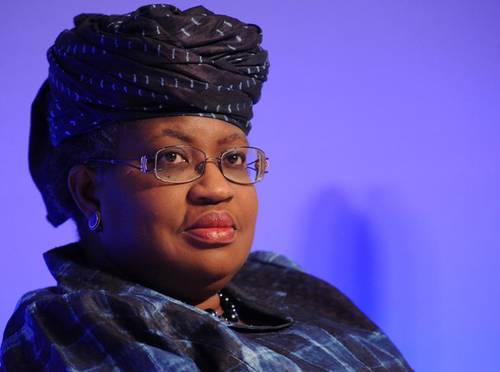WTO DG Expresses Fears Global GDP May Slide to 5%

There are growing fears that the real global gross domestic product (GDP) may slide to five percent if the world economy is decoupled into individual trading blocs.
This was the position of the Director General of the World Trade Organisation (WTO), Dr. Ngozi Okonjo-Iweala during the opening session of the 12th WTO Ministerial Conference in Geneva, Switzerland.
Okonjo Iweala urged members of the WTO to show that the body could deliver for the international community and the people of the world.
THISDAY NEWSPAPERS reports the WTO DG noting that the world has been suffering uncertainty and crises on multiple fronts.
The WTO DG said that over the next few days of the conference members would have a chance to “show the world that the WTO can step up to the plate.”
According to her, striking agreements in Geneva, “will enhance the ability of all members to respond to people’s aspirations at home — aspirations for food, for health, for security, for better jobs, higher living standards, and a sustainable environment on land, in the oceans, and in our atmosphere.”
She noted that the value of the multilateral trading system as a global public good over the past 75 years had delivered more prosperity than every international economic order that came before it.
She said this was at a time when the multilateral system was seemingly fragile.
According to her, “This is the time to invest in it, not to retreat; this is the time to summon the much-needed political will to show that the WTO can be part of the solution to the multiple crises of the global commons we face. Now, more than ever, the world needs WTO members to come together and deliver.”
She cited WTO economists’ estimates of real global GDP lowering by about five per cent if the world economy decouples into self-contained trading blocs, adding that substantial costs for governments and constituents in a scenario where WTO members are unable to deliver results and where they allow, or even embrace, economic and regulatory fragmentation.
She added, “To put this in perspective, the financial crisis of 2008-09 is estimated to have lowered rich countries’ long-run potential output by 3.5 per cent. And the five per cent estimate represents just the start of the economic damage. Additional losses would come from reduced scale economies, transition costs for businesses and workers, disorderly resource allocation, and financial distress.”
The WTO DG insisted that trade decoupling would entrench the development setbacks caused by the COVID-19 pandemic, making it much harder for poor countries to catch up with richer ones.
She said, “This would be a world of diminished opportunities, even greater political anger and social unrest, and intense migratory pressures as people leave in search of better lives elsewhere”, reports THISDAY Newspapers.
This was the position of the Director General of the World Trade Organisation (WTO), Dr. Ngozi Okonjo-Iweala during the opening session of the 12th WTO Ministerial Conference in Geneva, Switzerland.
Okonjo Iweala urged members of the WTO to show that the body could deliver for the international community and the people of the world.
THISDAY NEWSPAPERS reports the WTO DG noting that the world has been suffering uncertainty and crises on multiple fronts.
The WTO DG said that over the next few days of the conference members would have a chance to “show the world that the WTO can step up to the plate.”
According to her, striking agreements in Geneva, “will enhance the ability of all members to respond to people’s aspirations at home — aspirations for food, for health, for security, for better jobs, higher living standards, and a sustainable environment on land, in the oceans, and in our atmosphere.”
She noted that the value of the multilateral trading system as a global public good over the past 75 years had delivered more prosperity than every international economic order that came before it.
She said this was at a time when the multilateral system was seemingly fragile.
According to her, “This is the time to invest in it, not to retreat; this is the time to summon the much-needed political will to show that the WTO can be part of the solution to the multiple crises of the global commons we face. Now, more than ever, the world needs WTO members to come together and deliver.”
She cited WTO economists’ estimates of real global GDP lowering by about five per cent if the world economy decouples into self-contained trading blocs, adding that substantial costs for governments and constituents in a scenario where WTO members are unable to deliver results and where they allow, or even embrace, economic and regulatory fragmentation.
She added, “To put this in perspective, the financial crisis of 2008-09 is estimated to have lowered rich countries’ long-run potential output by 3.5 per cent. And the five per cent estimate represents just the start of the economic damage. Additional losses would come from reduced scale economies, transition costs for businesses and workers, disorderly resource allocation, and financial distress.”
The WTO DG insisted that trade decoupling would entrench the development setbacks caused by the COVID-19 pandemic, making it much harder for poor countries to catch up with richer ones.
She said, “This would be a world of diminished opportunities, even greater political anger and social unrest, and intense migratory pressures as people leave in search of better lives elsewhere”, reports THISDAY Newspapers.
FOLLOW US
